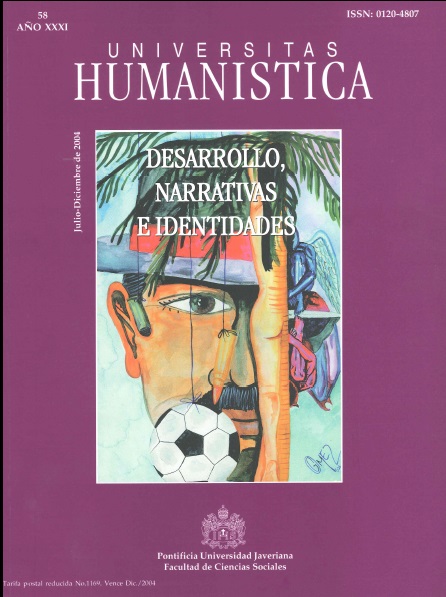Abstract
La investigación se interesó en estudiar el fenómeno de barras bravas desde una perspectiva antropológica, que resaltó elementos de orden cultural a partir de las manifestaciones de la barra entendida como un grupo social, con un interés comprensivo y utilizando una metodología de campo etnográfico cualitativa. El estudio se adelantó durante el año 2003 y parte de 2004.
La investigación se caracterizó metodológicamente por la participación de competencias lingüísticas, espaciales y corporales por parte del autor a través de las cuales fue aceptado por el grupo.
Partiendo de las evidencias observadas en el trabajo de campo, y desde la noción de campo deportivo, se fue orientando el enfoque teórico con base en la realidad de las dinámicas del grupo, lo que finalmente condujo a destacar dos categorías básicas como son la territorialidad y la identidad. Estas categorías son examinadas separadamente en términos analíticos, advirtiendo que en las prácticas sociales de la barra se expresan conjuntamente a través de las acciones y manifestaciones del grupo.

This journal provides immediate open access to its content on the principle that making research freely available to the public, encourages greater global exchange of knowledge.
The journal Universitas Humanística is registered under a Creative Commons Attribution 4.0 International Public License. Thus, this work may be reproduced, distributed, and publicly shared in digital format, as long as the names of the authors and Pontificia Universidad Javeriana are acknowledged. Others are allowed to quote, adapt, transform, auto-archive, republish, and create based on this material, for any purpose (even commercial ones), provided the authorship is duly acknowledged, a link to the original work is provided, and it is specified if changes have been made. Pontificia Universidad Javeriana does not hold the rights of published works and the authors are solely responsible for the contents of their works; they keep the moral, intellectual, privacy, and publicity rights.
Approving the intervention of the work (review, copy-editing, translation, layout) and the following outreach, are granted through an use license and not through an assignment of rights. This means the journal and Pontificia Universidad Javeriana cannot be held responsible for any ethical malpractice by the authors. As a consequence of the protection granted by the use license, the journal is not required to publish recantations or modify information already published, unless the errata stems from the editorial management process. Publishing contents in this journal does not generate royalties for contributors.


